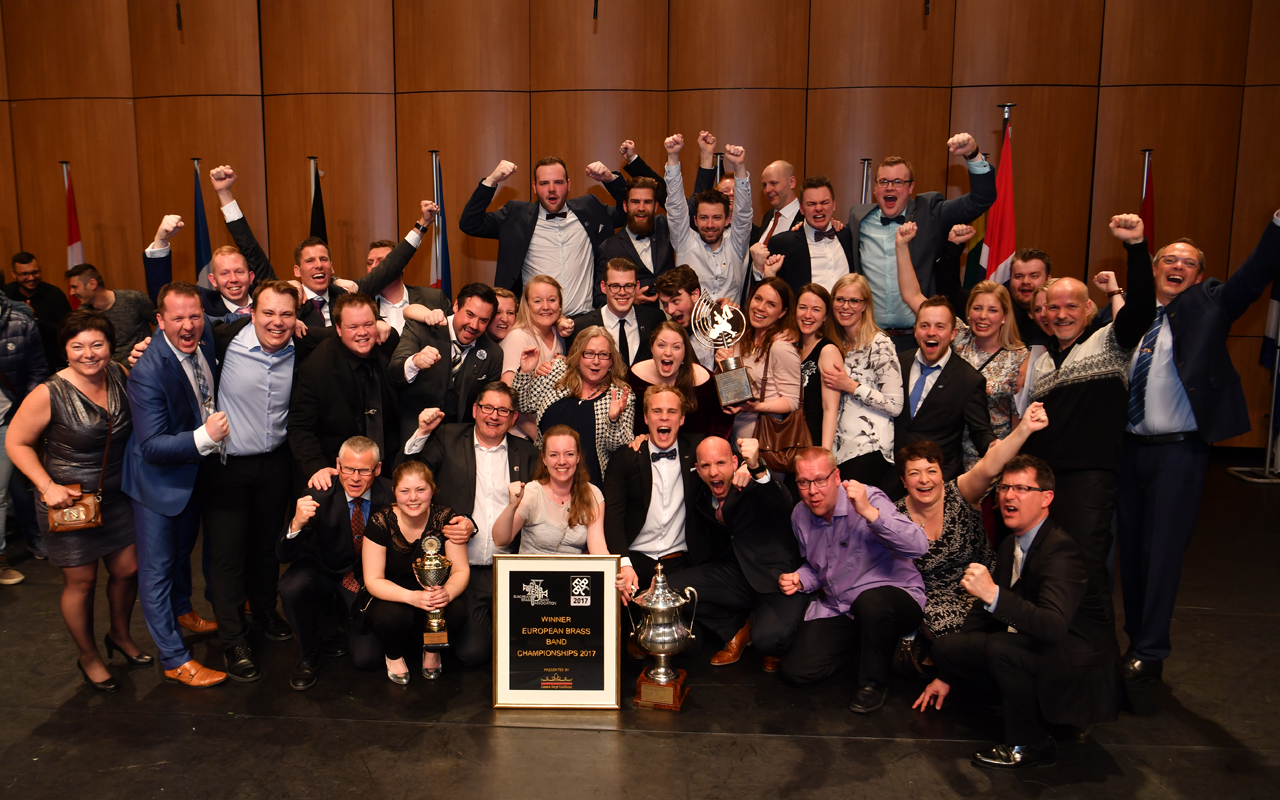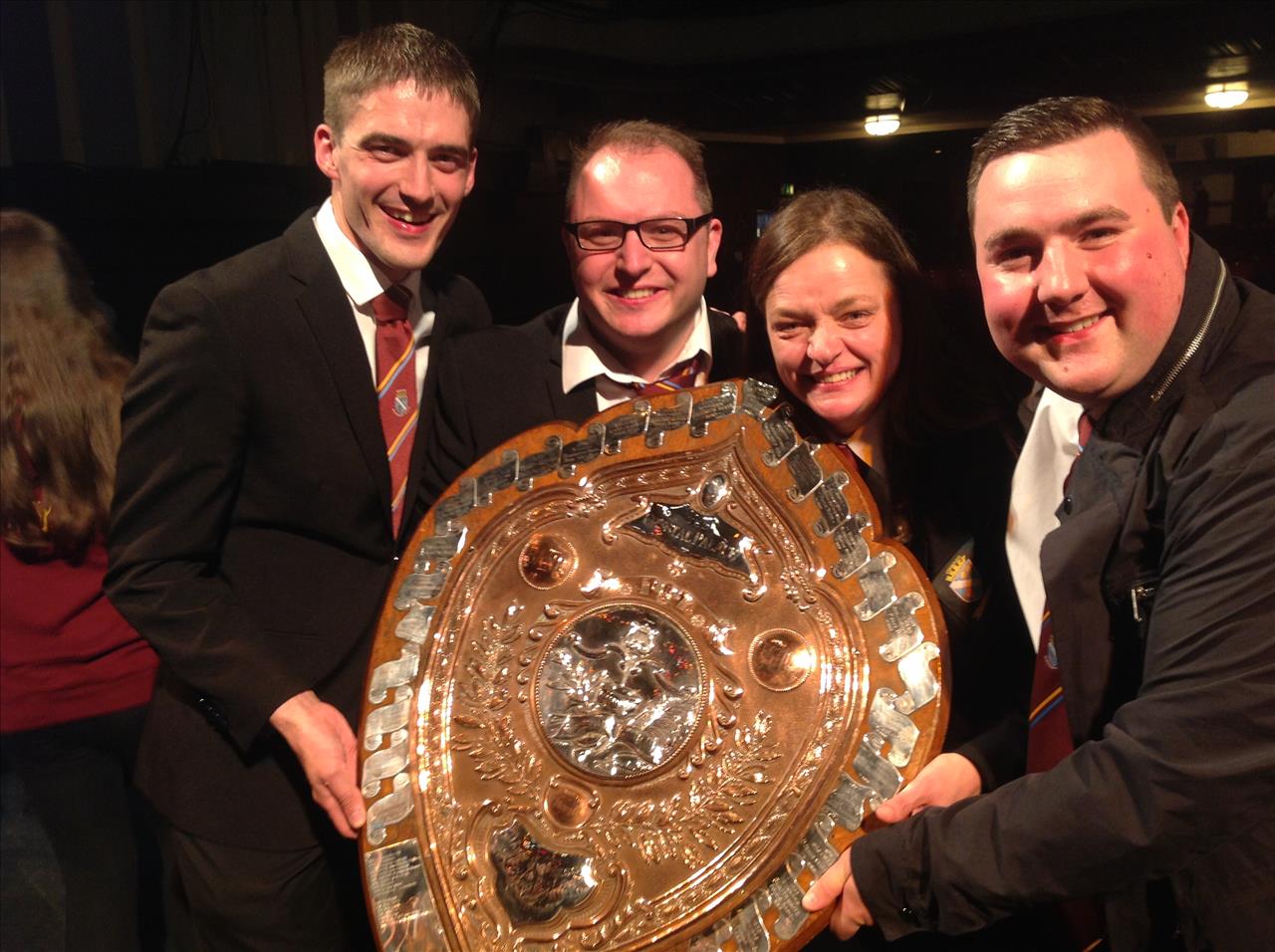Each year in a plush hotel somewhere in an expensive enclave of privilege, a select meeting of the mysterious members of the Bilderberg Group takes place. On their agenda is how the world’s elite remains just that - an unbridgeable distance apart from the rest of us.
However, this year, their titular head, the 5th Count of Castries, may well consider sending out a few invitations to some of the aristocratic performers of the brass band world, such has been their success in the past 12 months in remaining almost untouchably aloof from the rest of the contesting proletariat.

There was Elite level success for Eikanger on four occassions in 2017
RSVP letters
Could RSVP letters be arriving on the doorsteps of the world’s top 10 ranked bands - Cory, Brighouse & Rastrick, Eikanger Bjorsvik, Valaisia, Tredegar, Black Dyke, Whitburn, Foden’s, Grimethorpe and Willebroek in time for Christmas then?
If they are, then they’ve been due for some time, as 2017 saw banding’s elite further consolidate the yawning gap in what has become an ever widening class divide.
The top echelon of the latest 4BR/Band Supplies World Rankings now has more hereditary title holders than the benches of the House of Lords - and they don’t appear to be in the mood to lose any of them to usurpers outside their immediate hierarchy any time soon.
The top echelon of the latest 4BR/Band Supplies World Rankings now has more hereditary title holders than the benches of the House of Lords - and they don’t appear to be in the mood to lose any of them to usurpers outside their immediate hierarchy any time soon.
Eikanger now has the most of course, whilst Willebroek (plus a World Championship), Valaisia (plus a British Open) and Brighouse have added to their National entries in the brass banding version of Debretts. Cory, Whitburn, Black Dyke and Foden’s re-polished at least one of their existing family baubles.
The European’s top five finishers came from their group, and all six at the British Open. The Albert Hall saw them fill the podium places whilst five of the top six came from their ranks at Brass in Concert.

The remarkable rise of Valaisia in the past three years has seen them become a member of the banding elite
Little change
Cory has remained at the apex since 2007, but no less than six others in the 2014 end of year order (Black Dyke, Tredegar, Foden’s, Grimethorpe Colliery, Brighouse & Rastrick, Eikanger- Bjorsvik) have simply changed their seating arrangements on the top table in the three years since.
The new-era revolutionaries of the brass banding world are rather conspicuous by their absence.
Just three bands have dropped out during that period (to 31st Dec 2017): Fairey to 11th, Flowers to 13th and Brass Band Bugermusik Luzern to 17th - replaced by the remarkable rise of Valaisia (49th in 2015) and the resurgence of Whitburn (16th), who returned to the elite fold for the first time since 2007, and Brass Band Willebroek (13th).
The new-era revolutionaries of the brass banding world are rather conspicuous by their absence.
Grist to the mill
All this of course is grist to the mill to those who find the ranking of brass bands something of a needless anomaly; a flawed system of methodology that perpetuates the contesting status quo rather than recognising artistic excellence.
Others meanwhile will argue that given that the very lifeblood of brass banding is competition, it merely reflects those who are more successful at it than others. And as has been shown over the last three years at least, the top 10 are now very good at it indeed.

The Americans of Fountain City came close to breaking into the elite level in 2017
So whilst Fairey and Fountain City (12th) remain within potential touching distance of getting back to the Bilderberg soiree in the near future, it seems the rest, slowly but surely, are being cut adrift.
Carlton Main (14th) is now almost 150 ranking points behind Willebroek in 10th, Virtuosi GUS (16th) over 200, and Leyland almost 300. Elite level banding is fast becoming an exclusive and very familiar looking club. The divide is becoming almost unbridgeable.
Contesting changes
Without question it has been accentuated by significant contesting changes - notably the decision of the British Open to widen its invitation process to European contenders. Brass in Concert meanwhile has also broadened its worldwide entry list, whilst the European and National Championships have an increasingly familiar qualifying core of bands.
As a result, the elite bands are now competing against each other on a more regular basis, enabling the overall contest ranking co-efficient to increase and good results to be rewarded with more points.
As a result, the elite bands are now competing against each other on a more regular basis, enabling the overall contest ranking co-efficient to increase and good results to be rewarded with more points.
More of the same in 2018
For instance, 2018 will see five of the top 10 bands at the end of this year (Cory, Eikanger, Valaisia, Whitburn, Willebroek) compete at the European Championships in Utrecht, with up to nine at the British Open come September.
Brass in Concert may well see appearances of at least seven or more, whilst three (Cory, Brighouse & Rastrick and Tredegar) are already pre-qualified for the National Finals, with short odds on another four (Black Dyke, Whitburn, Foden’s and Grimethorpe) joining them there.

Whitburn returned to the top 10 for the first time in a decade after a fantastic year of success
So unless, someone from outside the top 10 can put together the type of contesting run that in 2017 propelled Whitburn from 15th to 7th, (and they had to retain the Scottish Championship, qualify for the British Open by winning the Grand Shield, then come runner-up at Symphony Hall and hold onto their Scottish Open title to do it) then the gap between the elite and the rest looks set to become ever more difficult to bridge.
Revolutionary gatecrashers
So can anyone do it in 2018?
Fairey (with the European, British Open and National Final already pre-booked) look best placed to make a return from temporary membership exile (2017 was first year out of the end of year top 10 rankings), although Fountain City (12th) may have peaked for the time being unless they return to the UK again in the next year or so.
Behind them, Flowers, Carlton Main, Co-operative Funeralcare and Virtuosi GUS are perhaps more outside bets at the moment, whilst the likes of Luzern, Treize Etoiles, Manger, Stavanger and Schoonhoven are currently playing catch-up on their own domestic fronts.
.jpg)
Can Garry Cutt and Fiarey return to the elite top 10 in 2018?
Good or bad?
So is this a good or bad thing if the banding world’s ‘Elite’ start to get themselves organised much like their Bilderberg counterparts and want to start exerting influence?
Good perhaps, if they wish to seek ways of using their collective strength to open discussions with organisers about modernising existing contest structures.
Bad however, if it simply leads to a Darwinian notion of survival of the fittest that concentrates on elite level competition to the detriment of everything else.
There is surely an inherent danger of an unofficial ‘Super League’ - entry to which could only come through invitation to elite events rather than by hard grafted competitive exception.
There is surely an inherent danger of an unofficial ‘Super League’ - entry to which could only come through invitation to elite events rather than by hard grafted competitive exception.
The Bilderberg Group isn’t exactly renowned for its policies on inclusion and wealth creation for the masses. And rarely does a form of ‘trickle down’ banding economics ever benefit others than those at the very top.
For the moment though, it seems the class divide may get a little wider before any form of revolutionary spirit to gatecrash their ranks may appear from banding’s proletariat masses.
Iwan Fox













